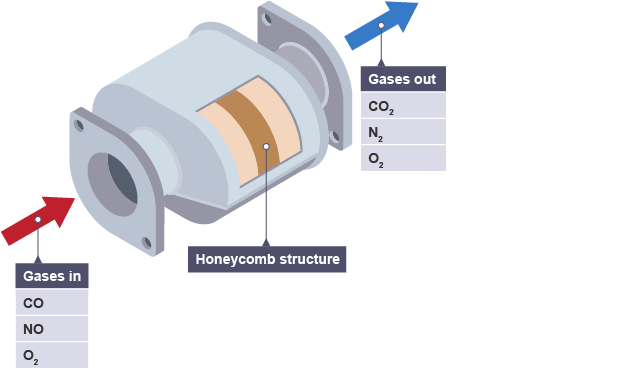What Is A Catalytic Converter Bbc Bitesize
Learn about and revise the impact of science and technology on society with this BBC Bitesize GCSE Chemistry OCR 21C study guide. In the life cycle of Plasmodium a mosquito sucks blood containing the protists from an infected person.

Catalytic Converter Catalysts Gcse Chemistry 9 1 Kayscience Com Youtube
What is a substrate BBC Bitesize.

What is a catalytic converter bbc bitesize. Is not chemically changed or used up at the end of the reaction. Simon FaulknerLearn the basics about catalytic converters as a part of the overall environmental chemistry. Click to see full answer.
Catalytic converters which first appeared on US. Speeds up the rate of a reaction. A catalyst is a substance which changes the rate of reaction but is unchanged at the end of the reaction.
A catalyst is specific to a particular reaction. Once bound to the active site the chemical reaction takes place. Different catalysts catalyse different reactions.
All resources are fully differentiated and SEN friendly. Catalytic converters are used to help to minimize the release of these toxic gases. These use transition metals such as rhodium palladium and platinum to convert harmful emissions into less harmful substances.
I am a leading practitioner of science who develops resources that promote active learning cooperative learning and maximum engagement. Only a very small. A catalytic converter is an emissions control device that converts toxic pollutants in exhaust gas to less toxic pollutants by catalyzing a redox reaction oxidation or reduction.
Beside above what are catalysts BBC Bitesize. A catalytic converter fitted to the exhaust of a car changes the pollutants carbon monoxide and nitrogen monoxide into less harmful carbon dioxide and nitrogen. Catalytic converters reduce harmful emissions of hydrocarbons carbon monoxide and nitrogen oxides into the atmosphere.
The substrate - the molecule or molecules taking part in the chemical reaction - fits into the active site. Only a very small amount of catalyst is needed to increase the rate of reaction between large amounts of reactants. A catalyst is a substance which changes the rate of reaction but is unchanged at the end of the reaction.
In an organism the active site of each enzyme is a different shape. A catalyst alters the rate of a reaction allowing it to be done at a lower temperature. Mosquitoes that carry malaria are often found in areas with higher temperatures in Africa Asia and South and Central America.
Only a very small amount of catalyst is needed to increase the rate of reaction between large amounts of reactants. A catalyst is a substance that. A catalyst is specific to a particular reaction.
Only a very small amount of catalyst is needed to increase the rate of reaction between large amounts of reactants. A catalyst is a substance which changes the rate of reaction but is unchanged at the end of the reaction. Catalytic converters are used with internal combustion engines fuelled by either petrol or diesel.
Learn about and revise the Earths atmosphere with this BBC Bitesize GCSE Chemistry OCR 21C study guide. Catalytic converters are a key component of a cars emissions system reducing the amount of harmful pollution going out the tailpipe. You may ask What is the substance that.
What are catalysts BBC Bitesize. Vehicles in 1975 transform hydrocarbons carbon dioxide and nitrogen oxides the bad stuff into water vapor and carbon monoxide the stuff we can live with. Malaria is a disease caused by a protist called Plasmodium.
GCSE catalytic converters. Get ready for your exams with this BBC Bitesize GCSE Chemistry Air and water OCR 21C exam preparation guide. Catalysts are therefore used in the chemical industry to make manufacturing processes more economical.
Different catalysts catalyse different reactions. Since the early 1990s car exhausts have been fitted with catalytic converters. Does not alter the products of the reaction.
They contain a ceramic honeycombed core coated with metals such as platinum. What is a Catalytic Converter. How Do Catalytic Converters Work.

Temperature Concentration Graphs Gcse Chemistry Reaction Rate Science Revision

Kinetics Theory Of Catalytic Mechanisms Heterogeneous Catalysis Homogeneous Catalyzed Reaction Examples Advanced A Level Gce Revision Notes

Reducing Pollutants Mapa Mental

A Flow Diagram Summarising The Manufacture Of Ammonia From Natural Gas Methane Steam And Air Chemical Engineering Nursing Student Tips Business Education

Unit 9a Inheritance And Selection

Gcse Science Revision Chemistry Catalysts Youtube
Eli5 How Does A Catalytic Converter Reduce Emissions Explainlikeimfive

Catalytic Converter Stolen Here S Why Youtube

Bbc Gcse Bitesize Ammonia And The Haber Process Gcse Chemistry Chemistry Lessons Science Revision

Revision Checklist For Igcse Chemistry 0620

What Are Catalytic Converters Environment Chemistry Fuseschool Youtube

Kinetics Theory Of Catalytic Mechanisms Heterogeneous Catalysis Homogeneous Catalyzed Reaction Examples Advanced A Level Gce Revision Notes

Gcse Physics Electric Motor What Is A Split Ring Commutator Gcse Physics Physics Gcse

Air Cie Igcse Chemistry Revision Notes

Air Cie Igcse Chemistry Revision Notes

Ammonia Ammonia Physical Science Diagram



Post a Comment for "What Is A Catalytic Converter Bbc Bitesize"